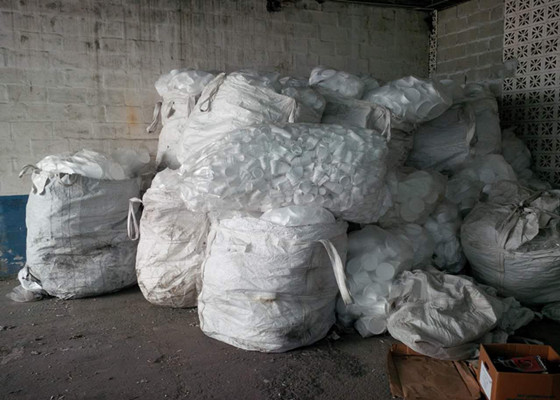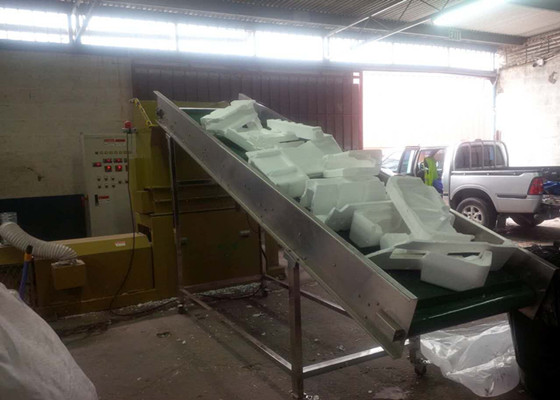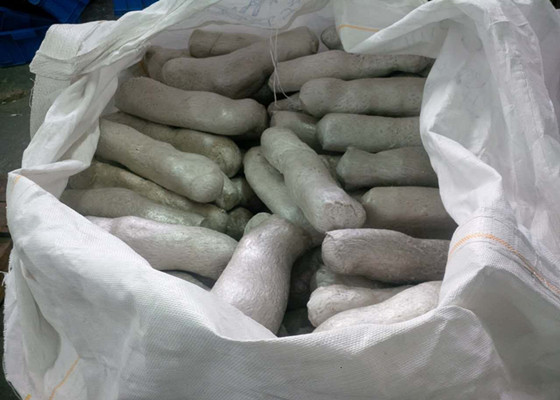The Styrofoam recycling rate is currently quite low in the world, only about 30% of the Styrofoam materials are recycled. Many recyclers still do not know how to handle the Styrofoam materials, and even many recyclers do not know that the Styrofoam can be recycled.
For example, a recycler which recycles a various of waste like PET bottles in Trinidad and Tobago had no idea that the Styrofoam materials can be recycled. GREENMAX from INTCO recycling conveyed the Styrofoam recycling concept to them and helped them develop a new recycling business.

The recycler in Trinidad and Tobago is a recycling company specializing in recycling all kinds of waste plastics, and they have their own warehouses. Their recycled waste is sold both at home and abroad. Many of the local recyclers like them haven’t been related to the Styrofoam recycling project before, and the Styrofoam recycling market was in a blank state at that time, which for them is a very good chance to open up the market.
GREENMAX thought that this recycling company totally had the ability to participate in the Styrofoam recycling, and its prospect was very bright because it was not difficult for them to collect Styrofoam materials. They finally decided to seize this opportunity to start collecting foam materials such as Styrofoam packaging and clean Styrofoam coffee cups. They also wanted to collect unclean Styrofoam materials before they knew that the unclean Styrofoam materials couldn’t be recycled and reused to make other products.
They chose the GREENMAX Mars series densifier M-C200 to recycle the Styrofoam packaging and coffee cups for the first step. The production capacity of the Styrofoam recycling machine is 200 kg / h. It can work at a ratio of 90: 1, which means that the melted foam ingots will be 90 times smaller than the loose foam.

The M-C200 Styrofoam densifier can not only help reduce the volume but also help save storage space and transportation costs. At the same time, the M-C200 is also equipped with a conveyor belt and an exhaust pipe. The conveyor belt can help workers control the feeding speed, which will help get better-melted ingots. The exhaust pipe can help eliminate the smell that appeared in the melting process and then avoid the workers being affected by the smell.
This Trinidad and Tobago recycling company don’t use this machine at all times, because they don’t handle the waste of Styrofoam every day. Usually, they will operate the machine when they accumulate enough Styrofoam coffee cups. As the biggest end-user of recycled EPS, all the recycled EPS ingots disposed of by GREENMAX are always guaranteed to be purchased back by INTCO at a very good price.

At present, this recycling company doesn’t use the machine frequently because they need to work on other waste recycling business too, there aren’t enough recycled foam ingots can be sold until now. But the current market and prospect of recycled Styrofoam raw materials are very good, so it will be enough time for them to adapt to this new recycling business.
Developing a new recycling business needs your insistence and courage, and you also need to learn to analyze the market. The most important thing is that you have to find a good “helper”: a professional Styrofoam recycling machine.
CASES
-
VIP Partner
-
EUROPE
-
OCEANIA
-
AFRICA
-
SOUTH AMERICA
-
NORTH AMERICA
- COM2
- Top-Line Furniture
- Conn's
- Temco
- Gold Circuit E-Recycling
- Amvic Inc
- Ritchie Trucking Service
- Cellox
- Quanta Computer
- Growpro
- Appliance Warehouse
- Foam Products Corporation
- John Ventresca Company
- Sylvan Vale Nursery
- ABT Electronics
- R & B
- PRC Industries
- Del Monterrey
- Sphere Renewables
- EMBALL' ISO
- PG&E
- UDP
- 1915 South
- Nissan
- OPCO
- Scandinavian Designs
- NCF
- Karran
- BPW
- TECNOLOSAS
- Mountaintop Beverage
- Hardwell
- Marcella's Appliance
- Pierson
- Atlas Foam Products
- City of Cedar Falls
- Marion County Recycling
- Tijuana
- Modern Polymer
- Spicher's Appliance
- SEKISUI Plastics
- AES
- PG&E
- Down East Seafood
- USA I
- USA II
- USA III
- USA IV
- USA V
- USA VI
- USA VII
- USA VIII
- USA IX
- USA X
-
ASIA
